Attacking Heart Problems at 30,000 Feet
Lufthansa rolls out the latest state of the art technology for saving lives on long-haul flights
June 12, 2019

On a 30-hour flight that took Leo Avelar from Sao Paolo to Bangkok on Emirates, the part-time Instagram travel influencer/ part-time heart surgeon did not get much sleep. That was because he was tending to calls by worried flight attendants to monitor the health of a passenger whose blood pressure had spiked to dangerous levels. While the cause could be anxiety or something a lot more serious, Avelar took steps to calm the passenger with the appropriate pharmacology and be on hand in case more drastic measures were required.
Unfortunately, Avelar said, that type of incident is all too common in his travels. But airlines, such as Lufthansa, are taking steps to ease the burden on doctors who may be on a flight by incorporating new life-saving technology.
App for That
Lufthansa is the first airline in the world to equip all of its long-haul aircraft with a mobile ECG (Electrocardiogram) system, called CardioSecur. In case of on-board medical emergencies, the compact, intuitive system allows flight attendants — often lacking in cardiological expertise — to record an ECG for passengers and send the test results directly to a medical hotline on the ground. The system was initially tested in 2018 on the A380 fleet, and now it is rolling out for medical emergencies on all long-haul aircraft within the Lufthansa fleet.
“The health of our passengers is very close to our hearts. Especially when they are feeling unwell on board, they should know that they are in good hands with Lufthansa. The results of the resting ECG conducted directly onboard the air-craft provide a better basis for deciding whether it is necessary to divert a plane in order to provide medical care on the ground in case of medical emergencies,” said Dr. Sven-Karsten Peters, a cardiologist with the Lufthansa Medical Service.
Cardiovascular complaints are the most common cause of medical incidents on board. If there are any doctors on the flight, they can use a defibrillator in most cases as a workaround to better assess the situation. However, the results from that machine cannot compare to an ECG.
The compact, light-weight mobile ECG system is used with an app on the flight attendant’s Cabin Mobile Device (mini iPad) along with a small bag with an ECG cable and four disposable electrodes. If a passenger complains of heart trouble, the system can record an ECG in a few short steps: First, the flight attendant establishes an internet connection via the FlyNet WiFi network on the Cabin Mobile Device and starts the app. The crew then connects the ECG cable to the four electrodes and places them on the upper body of the unwell passenger. The app records a 12-lead ECG. Additional parameters such as the patient’s age, weight, gender, blood pressure and oxygen saturation are captured manually.
The data then transfers from the app to the medical hotline of Interna-tional SOS (ISOS). This Lufthansa partner can be contacted by pilots and purs-ers 24/7 in case of medical questions. ISOS evaluates the ECG and advises the cockpit crew via telephone based on the gathered data. The cockpit crew can then make the final decision on whether it is necessary to divert the plane. If there is a doctor among the passengers on board, they can use the expert mode on the app to monitor the heart activity.
The existing program, “Doctor on Board,” allows the cabin crew to swiftly identify doctors present on board, including their specialties. This program provided by Austrian Airlines, Lufthansa and SWISS currently has 11,000 participating doctors from all specialties who can provide assistance in the case of medical incidents. For this purpose, an optimally equipped emergency kit that exceeds regulatory requirements is available, along with other materials. The crew is also well prepared for emergencies and receives first aid training every year.
Nurse Onboard
As an added benefit and service, Lufthansa now offers a medical travel assistance service in cooperation with the service provider Medical Travel Companion. Passengers can choose to book either a nurse, a paramedic or a doctor to care for them during their entire flight. Lufthansa is the first European airline to offer this service. The medical companion program has different packages that passengers can consider. Depending on their needs, customers can, for exam-ple, book medical supervision or someone expert in wound management.
Lufthansa also offers the Patient Transport Compartment (PTC) that is available for the repatriation of people who fall ill abroad or for the transportation of patients who require intensive medical care. The high-tech product is a kind of “flying ICU” (intensive care unit) that unites state-of-the-art technology, competent specialists and efficient processes with the comfort and safety like that of an isolated ICU. Lufthansa offers a variety of medical services, such as prebooking a stretcher for non-intensive patient transports, or providing medical oxygen. More information about these services is available here.




